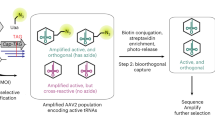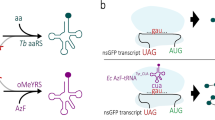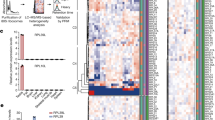Abstract
THE microinjection technique perfected by Gurdon and his collaborators1,2 represents an excellent method for the study of the in vivo effects of drastically changing the molecular contents of the injected cells. We have demonstrated3 that radioactive yeast transfer RNA injected into oocytes of Xenopus laevis is not appreciably degraded after 20 h of incubation inside these cells. It seems therefore, possible to modify the quantity and characteristics of the tRNAs present in frog oocytes and to test the effects that such changes may have on protein synthesis and other cellular processes. An important control in such a study is to determine whether the tRNAs microinjected into frog oocytes are functional in the sense that they can be aminoacylated by the recipient cell. This report presents evidence demonstrating that the amphibian oocyte is capable of aminoacylating yeast tRNAs injected into these cells at concentrations which are greatly in excess of their endogenous tRNA content.
This is a preview of subscription content, access via your institution
Access options
Subscribe to this journal
Receive 51 print issues and online access
$199.00 per year
only $3.90 per issue
Buy this article
- Purchase on Springer Link
- Instant access to full article PDF
Prices may be subject to local taxes which are calculated during checkout
Similar content being viewed by others
References
Gurdon, J. B., J. Embryol. exp. Morph., 20, 401–414 (1968).
Gurdon, J. B., Lane, C. D., Woodland, H. R., and Marbaix, G., Nature, 233, 177–182 (1971).
Allende, C. C., Allende, J. E., and Firtel, R., Cell, 2, 189–196 (1974).
Tarragó, A., Allende, J. E., Redfield, B., and Weissbach, H., Archs Biochem. Biophys., 159, 353–361 (1973).
Peacock, A. C., and Dingman, C. W., Biochemistry, 7, 668–674 (1968).
Jerez, C., Sandoval, A., Allende, J. E., Henes, C., and Ofengard, J., Biochemistry, 8, 3006–3014 (1969).
Legocki, A., and Marcus, A., J. biol. Chem., 245, 2814–2818 (1970).
Brown, D. D., and Littna, E., J. molec. Biol., 20, 95–112 (1966).
Airhart, J., Vidrich, A., and Khairallah, E. A., Biochem. J., 140, 539–548 (1974).
Van Venrooij, W. J., Moonen, H., and Van Loon-Klaasen, L., Eur. J. Biochem., 297–304 (1974).
Baldwin, A. N., and Berg, P., J. biol. Chem., 241, 839–845 (1966).
Brungraber, E. E., Biochem. biophys. Res. Commun., 8, 1–3 (1962).
Tarrago, A., Monasterio, O., and Allende, J. E., Biochem. biophys. Res. Commun., 41, 765–773 (1970).
Muench, K., and Berg., P., in Procedures in Nucleic Acid Research (edit. by Cantoni, G. L., and Davies, D. R.), 375–383 (Harper and Row, New York, 1966).
Author information
Authors and Affiliations
Rights and permissions
About this article
Cite this article
GATICA, M., TARRAGÓ, A., ALLENDE, C. et al. Aminoacylation of transfer RNA microinjected into Xenopus laevis oocytes. Nature 256, 675–678 (1975). https://doi.org/10.1038/256675a0
Received:
Accepted:
Issue Date:
DOI: https://doi.org/10.1038/256675a0
This article is cited by
Comments
By submitting a comment you agree to abide by our Terms and Community Guidelines. If you find something abusive or that does not comply with our terms or guidelines please flag it as inappropriate.



